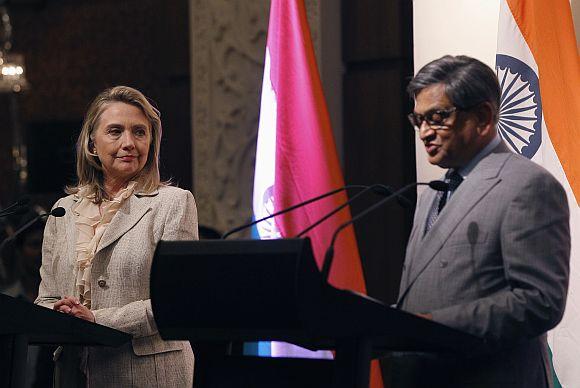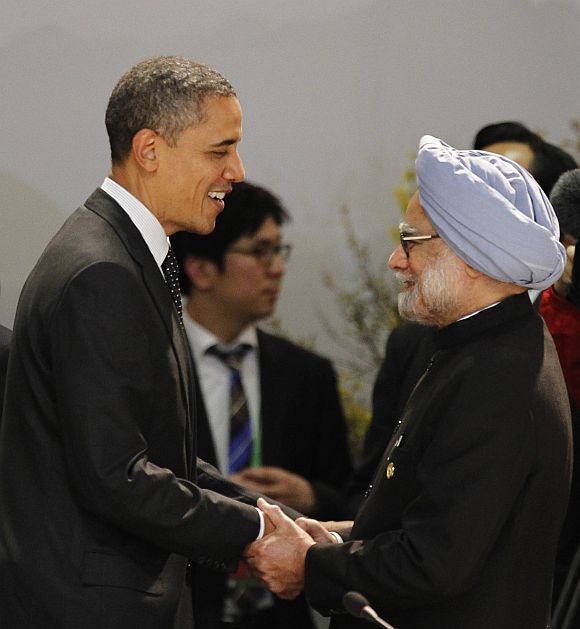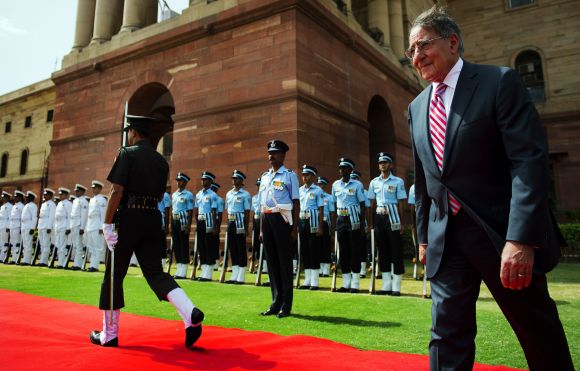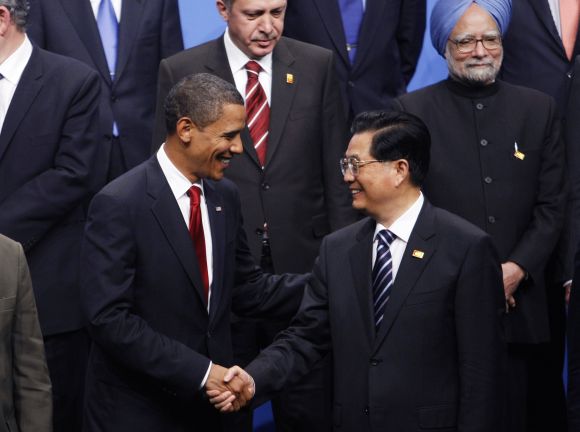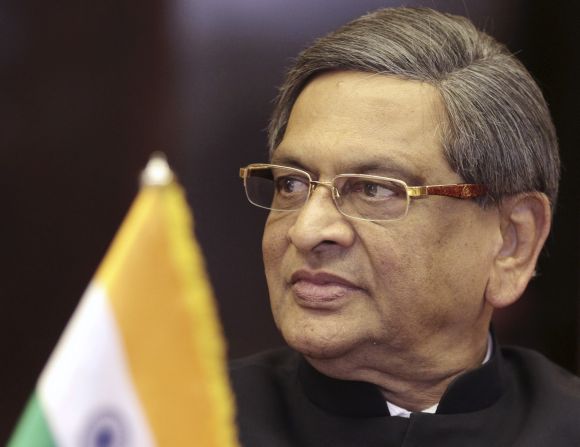 | « Back to article | Print this article |
'India must walk the extra mile to boost ties with US'
American and Indian leaders will hold their third round of strategic dialogue talks in Washington, DC, this week amidst growing concern that the US-India relationship is failing to live up to what US policymakers expected from it seven years ago, when the civil nuclear deal was first unveiled, say Lisa Curtis.
A number of differences between the US and India have arisen over the past couple of years. While none of the issues on its own would be a major cause of concern, when taken together, the irritants have led some in the US to question the value of India as a strategic partner.
This week's broad-based discussions offer an opportunity to reinvigorate ties and to remind both Indians and Americans alike why the relationship has repeatedly been referred to as a defining strategic partnership.
Lisa Curtis is Senior Research Fellow for South Asia in the Asian Studies Centre at The Heritage Foundation.
Courtesy: The Heritage Foundation
Please click NEXT to read further...
Cloudy path to better ties
There is a growing sense that the Indian leaders are less enthusiastic about embracing their US counterparts in order to demonstrate to domestic constituencies and an entrenched Indian bureaucracy that they are committed to preserving Indian independence and "strategic autonomy" in international affairs.
While New Delhi has expanded its strategic vision and broadened the definition of its security interests in recent years, particularly in East Asia, the overall thrust of India's foreign policy has remained relatively consistent with the idea of seeking geopolitical partnerships in multiple directions to serve its own national interests.
India's approach to relations with the US also increasingly reflects its concerns about a rising China. While India has agreed to a trilateral dialogue with the US and Japan, despite Chinese opposition, there are also signs that India will temper relations with the US from time to time in order to placate China.
A recent study by prominent Indian academics (with some involvement from Indian officials), Nonalignment 2.0: A Foreign and Strategic Policy for India in the 21st Century, argues that, due to shifting global power dynamics, it is too early to conclude that India would benefit from close ties with the US. The report goes on to note that another potential downside of focusing too much attention on building ties to the US is that it could "prematurely antagonise China."
Nuclear liability bill a major irritant
One of the major irritants in US-India relations has been the Civil Liability for the Nuclear Damages Bill, passed by the Indian Parliament in August 2010, which makes it difficult for US companies to invest in India's civil nuclear industry and has cast a pall over the historic US-India civil nuclear deal.
The deal, which involved the US spearheading a contentious international push to provide India access to nuclear fuel and technology for the first time in 35 years, is seen as the bedrock for the developing strategic partnership between the US and India.
The defence cooperation picture is mixed. On one hand, the US and India train together extensively and have completed over $8 billion (about Rs 44,000 crore) in defence contracts in the past five years. There are signs, however, that the two sides have divergent ideas on their future cooperation as part of the US plan to "rebalance" its forces toward the Asia Pacific.
During his trip to India last week, US Defence Secretary Leon Panetta reportedly received a cool response from his Indian counterparts. Although Panetta highlighted that defence cooperation with India is a linchpin of US strategy in Asia, Indian officials made clear that their country would not be part of any US military arrangements for the region and expressed unease about the US plan to boost its military presence in Asia by redeploying more US warships in the Pacific Ocean.
One source of tension in the relationship -- over Iranian oil sanctions -- appears to be moving in a more positive direction, at least for the short-term. The US announced recently that India, despite continuing to import Iranian oil, will receive a waiver from US sanctions, since it has "significantly" reduced its dependence on Iranian oil in recent years.
India's crude imports from Iran have a steadily declining share in India's total oil imports. For instance, they have dropped from a level of over 16 percent in 2008-2009 to around 10 percent in 2011-2012 and are expected to decline further in 2012-2013.
Long-term fundamentals of the relationship are strong
Despite the setbacks in relations over the past couple of years, it seems nearly inevitable that India will be an important partner of the US as both countries share democratic values and similar geopolitical goals, such as meeting the challenges of a rising China, controlling terrorism in the region, and ensuring that Afghanistan does not return to Taliban rule.
But in order to meet the full potential of the US-India partnership, India will have to find concrete ways to cooperate with the US on issues of strategic importance. For instance, New Delhi should demonstrate this week that it is taking steps to meet US concerns about its nuclear liability legislation.
The US should recognise the limits to the partnership
The US should acknowledge that its relationship with India will be unique and unlike the close partnerships it has forged with allies such as Japan, South Korea, and Australia. India still views itself as a defender of the less-developed world, and suspicions of US power and hegemony continue to define Indian political discourse. The US will have to be sensitive to these realities and lower expectations for the military relationship accordingly.
US should acknowledge Indian regional security concerns vis-a-vis Afghanistan without trying to make India part of the overall US-NATO strategy
Panetta's recognition of Indian interests in Afghanistan is welcome, but US officials should understand that India has been working to counter the Taliban and terrorism in Afghanistan long before the 9/11 attacks and will forge its own strategy after the US departs the region. Praising India for the work it is already doing to stabilise Afghanistan is helpful, but the US should be careful in pushing New Delhi to take on additional responsibilities at the behest of the US and NATO.
Coordinate quietly on China
While India's interest in pursuing trilateral US-Japan-India talks demonstrates that Indian leaders see value in coordinating policies with like-minded democracies, India is also taking care not to raise alarm bells in Beijing. Indian policymakers are forming their own complex response to cope with the uncertainty surrounding a rising China.
They are pursuing a robust diplomatic strategy aimed at encouraging peaceful resolution of their border disputes and growing trade and economic ties and at the same time embarking on an ambitious military modernisation campaign that will build Indian air, naval, and missile capabilities. While a certain degree of Indian ambivalence on how to effectively deal with China is understandable, Indian leaders need to ensure that their equivocation does not paralyse them or lead them to forgo good strategic options that maximise their security.
This time, the ball is in India's court
India and the US should accept that the burgeoning partnership will not always reach the full expectations of either side. Still, the growing strategic challenge presented by a rising China and the two countries' shared democratic values will inevitably drive them to increase cooperation.
This week's strategic dialogue offers an opportunity for New Delhi to take some key steps and go that extra mile in order to maintain confidence that the relationship is still worthy of the labels "strategic" and "defining."
This time, the ball is in India's court.
TOP photo features of the week
Click on MORE to see another set of PHOTO features...
